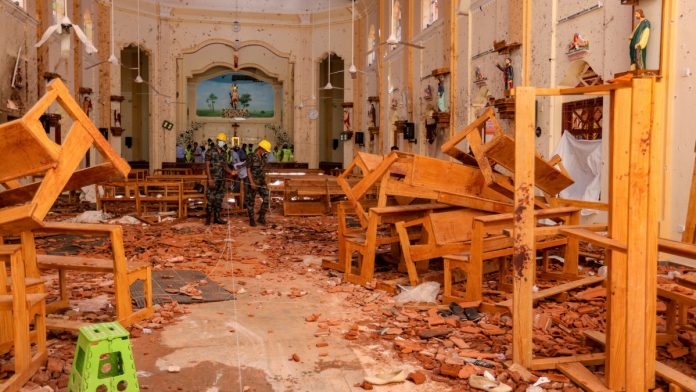Sri Lanka terror attacks: Lessons for the international community
By Achal MalhotraWhile the terrorists appear in solidarity with each other globally, the international community has failed to reach a consensus even on the definition of Terrorism.
Photo: Bloomberg

Serial Bomb Blasts in Sri Lanka : The Forces Behind/?
A series of bomb blasts shook the tiny Indian Ocean island of Sri Lanka in the morning of Sunday the 21st April. At last count around three hundred ,including 30 foreign nationals, were killed and more than five hundred injured. Over a dozen have been arrested on suspicion.
Sri Lanka has been by and large peaceful since its Army ruthlessly neutralised the LTTE in 2009 putting an end to three decades old bloody civil war between the ethnic minority of Sri Lankan Tamils and Sinhala majority.
It is abundantly clear that the attacks were well planned and executed in a coordinated manner at three different locations : Colombo, Negombo ( down south) and Batticallao in the East. More significantly, one particular minority – Roman Catholic Christians- was singled out as the main target as evident from the attack on three Churches , where the devotees had congregated for Easter prayers.
The Christians constitute ( about 7%) of Sri Lanka’s estimated 20mn population where Buddhists ( mostly Sinhalas ) are in majority (over 70 %) ; Hindus ( mostly Tamils ) ( over 12 %) and Muslims( mostly Sunnis) ( over 9%)are the other minority. The Sri Lankan Tamils have lived on the Northern and eastern parts of the island for centuries. The so called Indian Tamils are of Indian origin brought by the British relatively recently in 19th century to work on coffee and tea plantations, and reside mostly in Central Highlands.
There have been several incidents of ethno-religious clashes in Sri Lanka between the Buddhists and Hindus, Muslims and Buddhists and Hindus and Muslims. The Christians were ,however, rarely,if ever, involved.
Who is behind the attacks? No one has claimed responsibility though the Government has named a little- known Muslim organisation National Thowheed Jamath which caught the attention last year when it was accused of damaging Buddhist symbols. The organization is not known to have the capacity to carry out large scale operations. Even if it is presumed that the National Thowheed Jamad ( NTJ ) has tied up with some international network the question remains as to why target Christians? It is possible, however, that NTJ may have agreed to provide local support to some international network in return for the assurances of support in future.
The probability of LTTE ‘s revival by the Sri Lankan Tamils and being behind the blasts should be ruled out; had this been the case the targets would have been their core enemies namely Sinhalas, Sri Lankan leadership ,particularly former President Mahinda Rajapakse and Sri Lankan Army who were largely responsible for the defeat of LTTE and were accused of gross violations of human rights during the war against LTTE.
By available indications and looking at the scale and skills of the terrorist attacks, and also at the targets, one can safely surmise that the blasts were a part of global terrorism linked in particular to the so called war between the radical Islam and Christianity, represented by the West and led by the USA. It could well be in retaliation to the Christchurch terror attack in New Zealand in March this year. It is pertinent to note that in Christchurch Mosques were targeted and Muslims engaged in Friday prayers were killed. In the case of Sri Lanka , Churches were attacked while the Christians were offering Easter prayers.
Why Sri Lanka ? It seems that the Sri Lankan authorities became complacent after defeating the LTTE . According to official statements there were intelligence reports about a possible attack by NTJ but the concerned authorities did not act upon. The local Intelligence services definitely failed in detecting the invisible footprints of foreign terrorists on their soil and their links with the local miscreants.
The spread of global terrorism to Sri Lanka and ability to strike at will should be a matter of great concern not only for Sri Lanka and India but for the entire international community. The attacks must be viewed as a serious warning. Time is over for rhetoric. The need of the hour is to pool resources and act in a concerted manner to counter the growing menace of terrorism. It is a matter of regret that while the terrorists appear in solidarity with each other globally, the international community has failed to reach a consensus even on the definition of Terrorism and the deliberations on the Comprehensive Convention on International Terrorism remain inconclusive even though the proposal was first made by India way-back in 1996.
(The author is a retired diplomat and currently an independent analyst of international affairs and security matters. He had earlier served in the Indian High Commission in Colombo, Sri Lanka.)
Nice article…Need of the hour…!
thanks Mr Madhav Murumkar for your encouraging remarks .